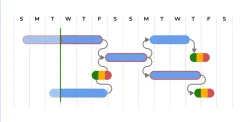The rise of Artificial Intelligence (AI) has sparked considerable debate across many industries, and project management is no exception. There's a prevailing discussion about AI's impact on how projects are planned, executed, and delivered. While some view AI as a potential disruptor that could replace human project managers, a more pragmatic perspective sees AI as a powerful tool designed to support project managers, not supersede them. The key to successful project management in the age of AI lies in integrating these advanced tools with timeless principles like critical thinking and holistic methodologies such as Critical Chain Project Management (CCPM).
A more pragmatic perspective sees AI as a powerful tool designed to support project managers, not supersede them
AI as an Enabler, Not a Decider
Imagine AI as an incredibly efficient assistant. It can sift through vast amounts of data, identify patterns, automate repetitive tasks, and even predict potential risks with remarkable accuracy.
- Data Analysis and Insights: AI can analyze historical project data to provide insights into realistic timelines, resource allocation, and budget estimations. This can help project managers make more informed decisions during the planning phase.
- Risk Identification and Mitigation: AI algorithms can monitor project progress in real-time, flagging potential deviations from the plan and identifying emerging risks long before they become critical. This proactive approach allows project managers to implement mitigation strategies sooner.
- Automation of Routine Tasks: From generating status reports to scheduling meetings and managing administrative tasks, AI can free up project managers from mundane duties, allowing them to focus on higher-value activities that require human assessment and interaction.
However, AI's output is based on data and algorithms: it lacks the nuanced understanding of human dynamics, stakeholder emotions, unforeseen external factors, and the ability to truly reason in complex, unpredictable situations. This is where critical thinking comes into play.
The Indispensable Role of Critical Thinking
Even with the most sophisticated AI tools, the project manager remains the ultimate decision-maker. Critical thinking is the human element that brings context, assessment, and adaptability to the project.
- Questioning Assumptions: AI provides data-driven recommendations, but a critical-thinking project manager will question the underlying assumptions of that data, consider its limitations, and assess its relevance to the current project's unique circumstances.
- Navigating Ambiguity: Projects are inherently complex and often involve navigating ambiguous situations that AI cannot fully grasp. A project manager uses critical thinking to make sense of incomplete information, adapt to changing requirements, and find creative solutions to unforeseen problems.
- Ethical Considerations and Stakeholder Management: AI can optimize for efficiency, but it cannot account for ethical implications, navigate office politics, or effectively manage diverse stakeholder expectations and emotions. These are inherently human skills that require empathy, negotiation, and critical judgment.
Critical Chain Project Management: A Holistic Approach
To truly leverage AI's capabilities while ensuring project success, project managers should adopt a holistic view, and methodologies like Critical Chain Project Management (CCPM) offer a robust framework. CCPM, developed by Dr. Eliyahu Goldratt, focuses on managing project uncertainties by protecting the project's critical chain (the longest sequence of dependent tasks, considering resource availability) with buffers, rather than padding individual tasks.
- Focus on the Critical Chain: CCPM identifies the absolute longest path through a project, taking into account resource constraints. This allows AI to optimize resource allocation along the critical chain.
- Strategic Buffers: Instead of adding safety time to every task (which often leads to Parkinson's Law – work expanding to fill the time available), CCPM places strategic project buffers at the end of the critical chain and feeding buffers at points where non-critical chains merge into the critical chain. AI can help monitor buffer consumption rates, providing early warnings if the project is falling behind.
- Resource Leveling: CCPM emphasises resource leveling to prevent bottlenecks. AI can analyse resource availability and task dependencies to suggest optimal resource assignments and identify potential conflicts before they arise.
- Holistic View of Dependencies: CCPM encourages a system-wide view of the project, understanding how different tasks and resources interact. AI can enhance this by visualising complex interdependencies and predicting the ripple effect of changes.
By combining the data-driven power of AI with the strategic, holistic thinking of CCPM, project managers can achieve a synergistic effect. AI can provide the granular data and predictive analytics to inform buffer management and resource allocation within a CCPM framework. The project manager, equipped with critical thinking, can then interpret these insights, make informed decisions, and guide the project to a successful conclusion.
In conclusion, AI is not here to replace the project manager but to empower them. It's a sophisticated tool that, when operated by a critically thinking project manager using a holistic methodology like CCPM, can significantly enhance efficiency, reduce risks, and ultimately improve project success rates. The future of project management is not AI or human intelligence; it's a powerful collaboration between the two.



